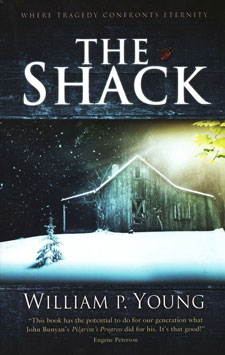The Shack has been something of a phenomenon in Christian publishing. The book, written by William P. Young for his children, published by friends, and promoted by word of mouth, is topping best seller lists in the United States and in Australian Christian bookstores.
The author is touring Australia this month for a series of talks and seminars. Readers are claiming that their lives have been changed and that they understand God as never before. Many are purchasing multiple copies to give to family and friends.
 So what is all the fuss about? Is this a helpful book for Christians or does it promote a dangerous, alternative view of God?
So what is all the fuss about? Is this a helpful book for Christians or does it promote a dangerous, alternative view of God?
As the book opens, Mack is living in the shadow of the abduction and murder of his seven-year-old daughter, Missy. He is a sad, cynical and angry man. Four years have passed, when he receives a mysterious invitation, apparently from God, to come to the shack, the place where evidence of his daughter's murder was found and where Mack had lost hope of ever seeing her again.
Amazingly, he goes and there meets God the Father called Papa, in the form of an amply proportioned African-American woman; Jesus, a Middle Eastern man; and Sarayu, an Asian woman who is the Holy Spirit. The book becomes a series of conversations between the main character Mack, and the persons of the Trinity over a weekend. William P. Young uses these exchanges to put his ideas into the mouth of God. But is his theology in line with Biblical revelation? Unfortunately not.
Firstly, sin is downplayed with Papa saying, "I don't need to punish people for sin. Sin is its own punishment, devouring you from the inside. It's not my purpose to punish it; it's my joy to cure it" (120). God's just response to sin is also changed, with Sophia (a personification of God's wisdom) saying, "He chose the way of the cross where mercy triumphs over justice because of love" (164). In Romans 3: 25-26 we read that the cross "demonstrates [God's] justice". Papa says, "Through his death and resurrection, I am now fully reconciled to the world" (192). However, we are told in Colossians 1:23 and elsewhere in the Bible, that we need to respond in faith to God's offer of reconciliation.
There are threads of universalism (the belief that all humanity are reconciled to God whether they believe or not) throughout the book. At one point Young even has Papa quote Buckminster Fuller, a Unitarian Universalist, saying, "I am a verb. I am that I am. I will be who I will be. I am a verb!" (204).
The Bible and church are subtly sidelined often in a gently mocking way. "In seminary he had been taught that God had completely stopped any overt communication with moderns, preferring to have them only listen to and follow sacred Scripture, properly interpreted of course" (65). The character of Jesus in a conversation about church says, "I don't create institutions " never have, never will" (179). Other forms of revelation are elevated. "You might see me in a piece of art, or music, or silence, or through people, or in Creation, or in your joy and sorrow," Sarayu says (198).
Trinitarian confusion abounds with Papa bearing the scars of crucifixion on her wrists. Papa says, "we were there together" and "regardless of what he [Jesus] felt at that moment, I never left him" (96). Young further claims all three persons of the Trinity were incarnate with Papa saying, "When we spoke ourself into human existence as the Son of God we became fully human" (99). There is also a denial of hierarchy within the Trinity " "we have no concept of final authority among us, only unity" and "hierarchy would make no sense among us" (122).
The god of The Shack is not the God of the Bible. The God Christians worship is loving and just. On the cross Jesus (alone) took the burden of our sin and endured God's wrath and judgment in our place. Not all are reconciled, but only those who by grace trust in Christ, and receive God's gift of salvation. God reveals himself through his word, the Bible, and his people are called into community, the Church.
Young does have some good things to say, and he conveys God's love in a compelling and emotional way. Unfortunately, at key points he deviates from Biblical revelation. It would appear Young has created a god of his own imagining, and written The Shack as a way of conveying his theology. There is a danger of readers replacing the God of the Bible with Young's god, in a very real sense, of worshipping an idol.

























